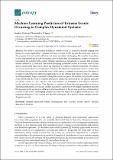Machine Learning Predictors of Extreme Events Occurring in Complex Dynamical Systems
Author(s)
Guth, Stephen Carrol; Sapsis, Themistoklis Panagiotis
DownloadPublished version (6.347Mb)
Terms of use
Metadata
Show full item recordAbstract
The ability to characterize and predict extreme events is a vital topic in fields ranging from finance to ocean engineering. Typically, the most-extreme events are also the most-rare, and it is this property that makes data collection and direct simulation challenging. We consider the problem of deriving optimal predictors of extremes directly from data characterizing a complex system, by formulating the problem in the context of binary classification. Specifically, we assume that a training dataset consists of: (i) indicator time series specifying on whether or not an extreme event occurs; and (ii) observables time series, which are employed to formulate efficient predictors. We employ and assess standard binary classification criteria for the selection of optimal predictors, such as total and balanced error and area under the curve, in the context of extreme event prediction. For physical systems for which there is sufficient separation between the extreme and regular events, i.e., extremes are distinguishably larger compared with regular events, we prove the existence of optimal extreme event thresholds that lead to efficient predictors. Moreover, motivated by the special character of extreme events, i.e., the very low rate of occurrence, we formulate a new objective function for the selection of predictors. This objective is constructed from the same principles as receiver operating characteristic curves, and exhibits a geometric connection to the regime separation property. We demonstrate the application of the new selection criterion to the advance prediction of intermittent extreme events in two challenging complex systems: the Majda-McLaughlin-Tabak model, a 1D nonlinear, dispersive wave model, and the 2D Kolmogorov flow model, which exhibits extreme dissipation events. Keywords: optimal predictors; binary classification; rare extreme events; chaotic systems; data-driven methods
Date issued
2019-09Department
Massachusetts Institute of Technology. Department of Mechanical EngineeringJournal
Entropy
Publisher
MDPI AG
Citation
Guth, Stephen and Sapsis, Themistoklis P., "Machine Learning Predictors of Extreme Events Occurring in Complex Dynamical Systems." Entropy 21, 10 (September 2019): 925 © 2019 The Author(s).
Version: Final published version
ISSN
1099-4300